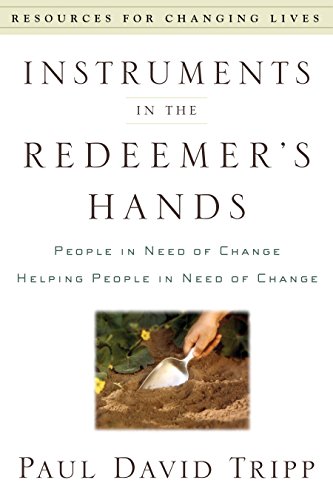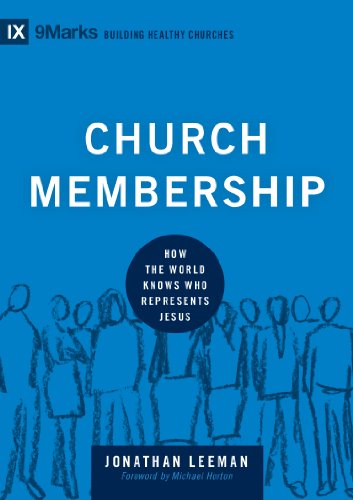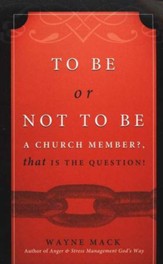Quotes about Church-Membership
New Testament evangelists make it easy to get into the church “that very hour,” but they also make it mean something to stay in. We, in contrast, make it hard to get in, but once in the body a member usually is secure for life regardless of his beliefs or lifestyle. It is easier to remain a member of the average church today than it is to continue one’s membership in a lodge! If we exercised biblical care and discipline, we would have little or no difficulty in adopting and following the biblical pattern.
Preaching With Purpose, Zondervan, 1982, p. 76. Get this book!
Jesus said, “I will build My church” (Matt. 16:18). If Jesus is committed to the church, should we be any less committed to it?
Nine Marks of a Healthy Church, Crossway, 2000, p. 145. Get this book!
Alan Redpath has said about the membership of the average American church that 5 percent don’t exist, 10 percent can’t be found, 25 percent don’t attend, 50 percent show up on Sunday, 75 percent don’t attend the prayer meeting, 90 percent have no family worship, and 95 percent have never shared the Gospel with others.
Nine Marks of a Healthy Church, Crossway, 2000, p. 173. Get this book!
If the church is a building, then we must be bricks in it; if the church is a body, then we are its members; if the church is a household of faith, then we are part of that household. Sheep are in a flock, and branches on a vine. Biblically, if we are Christians we must be members of a church. This membership is not simply the record of a statement we once made or of affection toward a familiar place. It must be the reflection of a living commitment or it is worthless.
Nine Marks of a Healthy Church, Crossway, 2000, p. 148-149. Get this book!
The man who attempts Christianity without the church shoots himself in the foot, shoots his children in the leg, and shoots his grandchildren in the heart.
Abide and Obey by Kevin DeYoung taken from The Hole in Our Holiness by Kevin DeYoung, copyright 2012, Crossway Books, a division of Good News Publishers, Wheaton Illinois 60187, www.crosswaybooks.org, p. 132.
Why should you join a church? Because by committing yourself in that way you will help to fulfill your purpose as a Christian. It seems pretty obvious from [the] biblical metaphors of building stones and body parts that the Christian life was not meant to be lived alone. You, as a Christian, were designed and created by God, not for a life of individuality and self-will, but to fill a niche in the spiritual building called the church.
Why Should I Join a Church? Christian Communicators Worldwide, www.CCWtoday.org. Used by Permission.
We are not called to live the Christian life apart from the protection of the church. The fellowship of a group of committed believers is vital to our spiritual health and to our endurance in the faith. The church, in the midst of this “crooked and perverse generation,” is just as important for our survival as the ark was to Noah and his family; they simply would not have survived without it.
Why Should I Join a Church? Christian Communicators Worldwide, www.CCWtoday.org. Used by Permission.
I heard of a man who said to the preacher, “I want to sing in your choir.” The preacher replied, “But you don’t belong here. Where do you have your membership?” He said, “I don’t belong to any local church. I belong to the invisible church.” The pastor said, “Then I suggest that you join the invisible choir.”
A church has no right to make anything a condition of membership which Christ has not made a condition of salvation.
The problem with conservative churches is not that they lack members. The problem is that many of those members are not converted. Millions of members of evangelical churches are absent from worship services each Sunday and are equally absent from Christian living during the rest of the week. Biblical illiteracy and unethical conduct by Christians seem to be on the rise. Many people who attend are indifferent to the truths of Christianity, and others are divisive, even mean-spirited.
Who Will Be Saved? Edited by: House, Paul and Thornbury, Gregory. Crossway, 2000, p. 164.
What could be more logical? He who believes in Christ is united with Christ. Faith binds him to Christ. He is a member of Christ’s body, the invisible church. But the visible church is but the outward manifestation of that body. Every member of the invisible church should, as a matter of course, be a member of the visible church. Extremely significant in this connection is Acts 2:47: “And the Lord added to the church daily such as should be saved.” Not only does the Lord Christ require of those who are saved that they unite with the church; He Himself joins them to the church. And the reference is unmistakably to the visible church.
It’s clear that in the days of the apostles, it was the universal practice to receive believers into the visible church. It’s possible that a true believer, because of some unusual circumstances, may fail to unite with the church. One may, for instance, believe in Christ and die before receiving baptism, or joining a local church. But such instances are exceptional. The Scriptural rule is that while membership is not a prerequisite for salvation, it is a necessary consequence of salvation.
What is a church membership?… It’s a declaration of citizenship in Christ’s kingdom. It’s a passport. It’s an announcement made in the pressroom of Christ’s kingdom. It’s the declaration that a professing individual is an official, licensed, card-carrying, bona fide Jesus representative.
What is a Church Member? ©9Marks. Website: www.9Marks.org. Email: [email protected]. Toll Free: (888) 543-1030. Used by Permission.
Church membership is a formal relationship between a local church and a Christian characterized by the church’s affirmation and oversight of a Christian’s discipleship and the Christian’s submission to living out his or her discipleship in the care of the church.
What is a Church Member? ©9Marks. Website: www.9Marks.org. Email: [email protected]. Toll Free: (888) 543-1030. Used by Permission.
Once you choose Christ, you must choose His people, too. It’s a package deal. Choose the Father and the Son and you have to choose the whole family – which you do through a local church.
We’ve Been Approaching it All Wrong by Jonathan Leeman taken from Church Membership by Jonathan Leeman, copyright (2012), Crossway Books, a division of Good News Publishers, Wheaton Illinois 60187, www.crosswaybooks.org. p. 31.
[In the Bible] to be a Christian is to belong to a church. No one gets saved and then wanders around by him or herself, thinking about whether to join a church. People repent and then are baptized into the fellowship of a church. Looking to Christ as Lord means being united to Christ’s people.
Membership Sightings in the New Testament by Jonathan Leeman taken from Church Membership by Jonathan Leeman, copyright (2012), Crossway Books, a division of Good News Publishers, Wheaton Illinois 60187, www.crosswaybooks.org. p. 46.
[Wrongly regarding church involvement]: Christians can think it’s fine to attend a church indefinitely without joining; Christians think of getting baptized apart from joining; Christians take the Lord’s Supper without joining; Christians view the Lord’s Supper as their own private, mystical experience for Christians and not as an activity for church members who are incorporated into body life together; Christians don’t integrate their Monday-to-Saturday lives with the lives of other saints; Christians assume they can make a perpetual habit of being absent from the church’s gathering a few Sundays a month or more; Christians make major life decisions (moving, accepting a promotion, choosing a spouse, etc.) without considering the effects of those decisions on the family of relationships in the church or without consulting the wisdom of the church’s pastors and other members; Christians buy homes or rent apartments with scant regard for how factors such as distance and cost will affect their abilities to serve their church; Christians don’t realize that they are partly responsible for both the spiritual welfare and the physical livelihood of the other members of their church, even members they have not met. When one mourns, one mourns by himself. When one rejoices, one rejoices by herself.
We’ve Been Approaching it All Wrong by Jonathan Leeman taken from Church Membership by Jonathan Leeman, copyright (2012), Crossway Books, a division of Good News Publishers, Wheaton Illinois 60187, www.crosswaybooks.org. p. 23-24.
It’s true that a Christian must choose to join a church, but that does not make it a voluntary organization. We are, in fact, obligated to choose a local church just as we are obligated to choose Christ. Having chosen Christ, a Christian has no choice but to choose a church to join.
What is a Church? What is a Church Member? by Jonathan Leeman taken from Church Membership by Jonathan Leeman, copyright (2012), Crossway Books, a division of Good News Publishers, Wheaton Illinois 60187, www.crosswaybooks.org, p. 66.
1. Members should formally affirm their pastors. 2. Members should honor their pastors. 3. Members should submit to their pastors. 4. Members should pray for their pastors. 5. Members should bring charges against disqualified pastors. 6. Members should fire gospel-denying pastors.
How Does a Christian Submit to a Church by Jonathan Leeman taken from Church Membership by Jonathan Leeman, copyright (2012), Crossway Books, a division of Good News Publishers, Wheaton Illinois 60187, www.crosswaybooks.org, Summarized, p. 104-106.
1. It’s biblical. Jesus established the local church and all the apostles did their ministry through it. The Christian life in the New Testament is church life. Christians today should expect and desire the same. 2. The church is its members. To be “a church” in the New Testament is to be one of its members (read through Acts). And you want to be part of the church because that’s who Jesus came to rescue and reconcile to himself. 3. It’s a pre-requisite for the Lord’s Supper. The Lord’s Supper is a meal for the gathered church, that is, for members (see 1 Cor. 11:20, 33). And you want to take the Lord’s Supper. It’s the team “jersey” which makes the church team visible to the nations. 4. It’s how to officially represent Jesus. Membership is the church’s affirmation that you are a citizen of Christ’s kingdom and therefore a card-carrying Jesus Representative before the nations. And you want to be an official Jesus Representative. Closely related to this. 5. It’s how to declare one’s highest allegiance. Your membership on the team, which becomes visible when you wear the “jersey,” is a public testimony that your highest allegiance belongs to Jesus. Trials and persecution may come, but your only words are, “I am with Jesus.” 6. It’s how to embody and experience biblical images. It’s within the accountability structures of the local church that Christians live out or embody what it means to be the “body of Christ,” the “temple of the Spirit,” the “family of God,” and so on for all the biblical metaphors (see 1 Cor. 12). And you want to experience the interconnectivity of his body, the spiritual fullness of his temple, and the safety and intimacy and shared identity of his family. 7. It’s how to serve other Christians. Membership helps you to know which Christians on planet Earth you are specifically responsible to love, serve, warn, and encourage. It enables you to fulfill your biblical responsibilities to Christ’s body (for example, see Eph. 4:11-16; 25-32). 8. It’s how to follow Christian leaders. Membership helps you to know which Christian leaders on planet Earth you are called to obey and follow. Again, it allows you to fulfill your biblical responsibility to them (see Heb. 13:7; 17). 9. It helps Christian leaders lead. Membership lets Christian leaders know which Christians on Planet Earth they will “give an account” for (Acts 20:28; 1 Peter 5:2). 10. It enables church discipline. It gives you the biblically prescribed place to participate in the work of church discipline responsibly, wisely, and lovingly (1 Cor. 5). 11. It gives structure to the Christian life. It places an individual Christian’s claim to “obey” and “follow” Jesus into a real-life setting where authority is actually exercised over us (see John 14:15; 1 John 2:19; 4:20-21). 12. It builds a witness and invites the nations. Membership puts the alternative rule of Christ on display for the watching universe (see Matt. 5:13; John 13:34-35; Eph. 3:10; 1 Peter 2:9-12). The very boundaries which are drawn around the membership of a church yields a society of people which invites the nations to something better.
What are a Church and its Members Like? by Jonathan Leeman taken from Church Membership by Jonathan Leeman, copyright (2012), Crossway Books, a division of Good News Publishers, Wheaton Illinois 60187, www.crosswaybooks.org, p. 79-81.
Look for the ones who are poor in spirit; who mourn their sin; who aren’t entitled, always insisting on their own way, but are meek; who are sick to death of sin and all its nonsense and so hunger and thirst for righteousness like it is water. When you find people like that, make sure they know who Jesus is. Make sure Jesus is the one who fills their impoverished spirit, who has forgiven their sins, who receives their life and worship, and whose righteousness they depend upon and pursue. When you find such people, tell them to join!
What are the Standards for Membership? by Jonathan Leeman taken from Church Membership by Jonathan Leeman, copyright (2012), Crossway Books, a division of Good News Publishers, Wheaton Illinois 60187, www.crosswaybooks.org, p. 88.
It’s not a person’s moral perfection that qualifies him or her for church membership. It’s just the opposite. It’s his or her recognition of a lack of moral perfection coupled with a hunger for it. It’s not the people who never sin; it’s the people who fight against sin. A church’s judicial work is to affirm not the righteous but the unrighteous who thirst for righteousness – the righteousness only God in Christ can give.
What are the Standards for Membership? by Jonathan Leeman taken from Church Membership by Jonathan Leeman, copyright (2012), Crossway Books, a division of Good News Publishers, Wheaton Illinois 60187, www.crosswaybooks.org, p. 88-89.
We must grasp once again, the idea of church membership as being the membership of the body of Christ and as the biggest honour which can come a man’s way in this world.
You have been joined together with Christ… You bear His name. Are you ashamed to belong? Are you ashamed to bear that identification with other believers of like precious faith?… Shouldn’t you be willing outwardly to identify with the visible, gathered members of that group to which you eternally belong?
Reasons for Church Membership:
1. The “One Anothering” commands of Scripture.
2. Biblical responsibility to elders.
3. Clarifying the differences between believers and unbelievers.
4. Orderly administration of the church.
5. Public statement to the world.
6. Ministry responsibilities.
7. Ministry privileges.
8. Accountability.
9. Helps the church know who to prioritize for service.
To Be or Not To Be a Church Member, Calvary Press, 2004, Summary of Mr. Mack’s Points.
Scripture speaks very clearly to the fact that identification with God’s people in a formal, public way was considered essential in…New Testament times… A careful study of the New Testament doesn’t reveal even a hint of any believer who was truly saved, but not part of a local church.
Many of our responsibilities to believers are spelled out in terms of the “one another commands” found throughout Scripture. There are fifty-eight “one another commands” in the Word of God, and, realistically understood, it’s impossible to understand how these commands may be truly fulfilled toward other believers without involvement in a local church… In all of Paul’s “one anothering” passages, he was instructing the members of a specific local church to act in these ways toward one another.
If…we do not think that a local church is worthy of joining, why should we be considered worthy of serving in it?
Being outside the church is being in Satan’s domain. The Bible indicates that Satan is the “god of this world,” whereas the church is the expression of God’s kingdom on earth and is ruled by Christ, not Satan. Those who are in the world (i.e., outside of Christ) are in Satan’s domain and under his authority. Those who are in the church are under Christ’s authority (2 Corinthians 4:4; Ephesians 2:2; I John 5:19). Consequently, because Christ reigns supremely in the local church, it’s a dangerous thing for a believer not to be identified with one. When we function on our own, outside the church, we’re asking to be knocked around by Satan.
Church membership is not an incidental or optional matter for the Christian. Rather, it’s an essential and important aspect of the Christian life. According to Scripture, being a part of a local church brings with it tremendous privileges, and serious responsibilities, that can be fulfilled in no other way.
A child without a family is an orphan to be pitied. A man without a country is a refugee to be welcomed. A Christian without a church is, well, a typical American evangelical.
In the New Testament there is no such person as a Christian who is not a church member. Conversion was described as “the Lord adding to the church” (Acts 2:47). There was no spiritual drifting (Douglas Millar).
Should I Join A Church? Issue 62, Nov. 1968, p. 21, by permission Banner of Truth, Carlisle, PA.
The family of God is ethnically and culturally diverse. As Christians we not only permit such diversity, but we cherish it. This is because God Himself cherishes ethnic diversity. He is not color-blind; He is colorful. At His throne God welcomes worshipers “from every nation, tribe, people and language” (Rev. 7:9). His plan of redemption is for the peoples of the world in all their rich variety.
Do we really wish to make it harder to get into the church than Jesus makes it to get into heaven?
What, after all, is church membership? I would argue that it is a covenant grounded in the affirmations of both the church through the elders, and the member. That is, the member publicly affirms both his dependence on the finished work of Christ alone, his affirmation of the faith once delivered, and his willingness to submit to the church. The church, on the other hand, affirms its conviction, through the elders of the credibility of the profession of faith of the member, and vows to serve and protect the member through the means of grace, including faithful church discipline. To put it more simply, the undershepherds affirm the sheepness of the member, the member the undershepherdness of the elders.
Ask RC: Should Churches Have New Members Classes? January 16, 2014, Used by Permission.
I well remember how I joined the church after my conversion. I forced myself into it by telling the pastor, who was lax and slow, after I had called four or five times and could not see him, that I had done my duty, and if he did not see me and interview me for church membership, I would call a church meeting myself and tell them I believed in Christ and ask them if they would have me.
I know there are some who say, “Well, I’ve given myself to the Lord, but I don’t intend to give myself to any church.” I say, “Now why not?” And they answer, “Because I can be just as good a Christian without it.” I say, “Are you quite clear about that? You can be as good a Christian by disobedience to your Lord’s commands as by being obedient? There’s a brick. What is the brick made for? It’s made to build a house. It is of no use for the brick to tell you that it’s just as good a brick while it’s kicking about on the ground by itself, as it would be as part of a house. Actually, it’s a good-for-nothing brick. So, you rolling stone Christians, I don’t believe that you’re answering the purpose for which Christ saved you. You’re living contrary to the life which Christ would have you live and you are much to blame for the injury you do.”
Just how important is your church? Consider the following:
1. It provides you with daily and weekly fellowship.
2. It warns and encourages you.
3. It helps hold you accountable.
4. It provides communion for you.
5. It challenges you to use your spiritual gifts.
6. It provides a place for those gifts to be exercised.
7. It helps protect you from heresy.
8. It guides you to godly living.
9. It spiritually ministers to your family.
10. It collectively supports Christian causes and missions around the world.
11. It often means the salvation of souls (perhaps even your own).
12. It helps you when you are spiritually, emotionally, physically or financially in need.
13. It is the pillar and ground of the truth in your area.
14. It disciplines you when you develop a sinful lifestyle.
15. It helps bring down racial barriers.
These are just a few of the benefits of belonging to a good local church.
Life in the Body of Christ, Founders Press, 2006, p. 73-74, www.founders.org. Used by Permission. Get this book!
As wonderful and sophisticated as the heart is, it was never made to be just a heart, but a part of a body. It has no value to the body outside the body. And the heart itself can’t thrive outside the body. As incredible and wonderful as you are, Christian, you were never made just to be an individual Christian, but a part of body. As every organ and every cell is God-created to be an active member of the human body, so every true Christian is God-created to be an active member of a local body of Christ.
Why Join a Church? Originally written in: Spiritual Disciplines Within the Church, Moody, 1996, www.BiblicalSpirituality.org. Used by Permission.
When you join a church you make it clear whose side you’re on. You’re telling the family of God that you’re part of the family too, and that you don’t want to be considered on the “outside” (1 Corinthians 5:12-13) any longer.
Why Join a Church? Originally written in: Spiritual Disciplines Within the Church, Moody, 1996, www.BiblicalSpirituality.org. Used by Permission.
The New Testament uses several metaphors to describe churches… A flock of sheep isn’t a random collection of ewes, rams, and lambs. Shepherds know their flocks. They know which sheep are theirs to care for and which are not. Sheep belong to specific flocks. This is also the way it should be for God’s spiritual sheep. A temple building, just like a church building, shouldn’t have any loose bricks or blocks. If it does, something’s wrong. Each one of them has a definite place. “There is no place,” said an English preacher long ago, “for any loose stone in God’s edifice.” The same analogy is true for a human body. Your body isn’t a casual collection of loosely related parts. You don’t keep your fingers in your pocket until you need them. They are joined. They are members of the body. The local body of Christ should be like this also – those joined to Christ, who are members of His body – should express that relationship through a visible membership. And in a household, a family, you’re either a member or you’re not. So if you are part of the family of God, show it by joining a local expression of God’s family.
Why Join a Church? Originally written in: Spiritual Disciplines Within the Church, Moody, 1996, www.BiblicalSpirituality.org. Used by Permission.
When you join a church, you make it visible. You give a living demonstration of the spiritual reality of the body of Christ. You show that even though you are an individual, you are a part of the body; you are joined together with others. You take the body of Christ out of the realm of the theoretical (1 Cor. 12:27) and give it a meaning that people can see.
Why Join a Church? Originally written in: Spiritual Disciplines Within the Church, Moody, 1996, www.BiblicalSpirituality.org. Used by Permission.
Membership in a local church does not mean that you are part of the body of Christ. Without Christ, church membership means nothing. Hell is filled with people who were church members. Before you respond to the challenge of church membership, you must make sure you know Jesus Christ, who is “head over all things to the church” (Ephesians 1:22). Your greatest need in life is not to be on the membership roll of a church; it is to be made right with God by the One who died for the church, who created the church, who loves the church, and who is returning someday for His true church.
Why Join a Church? Originally written in: Spiritual Disciplines Within the Church, Moody, 1996, www.BiblicalSpirituality.org. Used by Permission.
Recommended Books

























